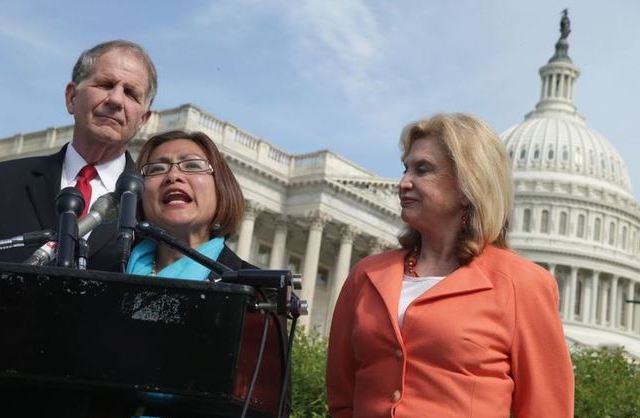 Human trafficking survivor Shandra Woworuntu (C) with U.S. House of Representatives Victims' Rights Caucus Chairman Rep. Ted Poe (L) and Rep. Carolyn Maloney at the U.S. Capitol in DC on May 20, 2014.
Human trafficking survivor Shandra Woworuntu (C) with U.S. House of Representatives Victims' Rights Caucus Chairman Rep. Ted Poe (L) and Rep. Carolyn Maloney at the U.S. Capitol in DC on May 20, 2014.
VOA News
Photo: AFP
By Cindy Saine
CAPITOL HILL — Many Americans think of human trafficking as a problem that exists far away from U.S. shores, such as the case of the almost 300 Nigerian girls who were kidnapped by Boko Haram and are still missing.
But the U.S. government says as many as 17,500 people, mostly girls, are trafficked into the United States annually, and that does not include those who are kidnapped and forced into sex slavery within U.S. borders.
The U.S. House of Representatives has taken action to help the victims and to crack down on perpetrators.
A survivor of human trafficking, Shandra Woworuntu, was on Capitol Hill Tuesday to advocate for restitution and other government services to help victims. Woworuntu is originally from Indonesia. She is college-educated and worked as a financial analyst in her country until she lost her job due to political instability.
Woworuntu came to the United States in 2001 under the false impression that she had been offered a job in the hospitality industry, but she was kidnapped at the airport in New York and forced into sex slavery, as she told VOA:
“During my arrival someone picked me up, and took me into the van. They took my passport, they took my hidden ticket, and the same day I was trafficked into underground sex business,” said she.
Woworuntu escaped and her trafficker is now in prison. She received help from a non-profit organization and now advocates to raise awareness about human trafficking.
Democratic and Republican lawmakers joined forces on five bills to help state and local governments develop victim-centered programs and to train law enforcement officers to rescue victims and not to treat them as prostitutes. House Majority leader Eric Cantor called for bipartisan efforts to address the problem.
“And we must confront this issue head on, not just as Republicans, not just as Democrats, but as dads, as moms, as sisters and brothers. We must protect our children,” said Cantor.
Representative Carolyn Maloney has worked to combat human trafficking internationally for more than a decade.
“There is no crime on earth more appalling, no offense as terrible, no act of depravity as harmful to the community of a nation and certainly to the individuals affected,” said Maloney.
The five bills, which must be approved by the Senate, also seek to reduce the demand for human trafficking by encouraging police and judges to treat those who solicit sexual activities from minors as human traffickers, rather than petty criminals. The average age for girls forced into sex slavery is 13, and the average age for boys is 12.
—
US Using Chad as Base in Search for Nigerian Girls

Nigerians take part in a protest demanding for the release of secondary school girls abducted from the remote village of Chibok, in Asokoro district in Abuja, Nigeria, May 13, 2014. (Photograph: Reuters)
By Jeff Seldin
May 21, 2014 3:41 PM
PENTAGON — U.S. President Barack Obama has deployed 80 U.S. military personnel to Chad to help find more than 250 schoolgirls kidnapped by Islamist militants last month in neighboring Nigeria.
Pentagon officials said the Air Force team will fly unmanned and unarmed aircraft over northern Nigeria and that Chad’s proximity to the search area will cut down on travel time, allowing for around-the-clock surveillance.
GlobalSecurity.org’s Tim Brown told VOA via Skype launching drones from Chad also gives the U.S. more flexibility.
“They’re probably going to be used for a wider area of search, surveillance and then support if there happens to be a hostage rescue attempt or any kind of on the ground deployment of troops,” he said.
The move, announced in a letter from U.S. President Barack Obama to lawmakers, is part of Washington’s ongoing effort “to locate and support the safe return” of the girls, kidnapped last month by Boko Haram, the militant Islamic sect that has been terrorizing Nigeria.
But it’s an effort that’s been complicated by concerns about the Nigerian government, and weaknesses Brown said have been further exposed by Boko Haram’s actions.
“They’re [Boko Haram] showing the fact that these guys [the Nigerian government] are not able to walk and chew gum at the same time and they’re corrupt, and they are,” he said.
The new drone flights from Chad will be in addition to ongoing U.S. surveillance efforts.
“We’re flying unmanned reconnaissance flights over the areas in which we think it’s possible for the girls to be. We’ve not seen anything that indicates their location at this point,” said Pentagon spokesman Rear Admiral John Kirby earlier this week.
So far, the flights have produced little. “People have said it’s a needle in a haystack. It’s a needle in a jungle,” Kirby said.
U.S. military officials remain convinced Boko Haram has split the girls up into smaller groups and may be moving them around, making the search even more difficult. But they said the U.S. will do all it can to find the girls short of sending in combat troops, or as they put it, putting boots on the ground.
—
Join the conversation on Twitter and Facebook.

























